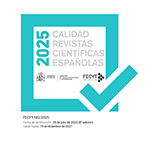In pursuit of the first Homo: Management of Archaeological Research in Olduvai Gorge (Tanzania)
Abstract
The sites at Olduvai Gorge (Tanzania) constitute a unique venue for the study of the first members of the genus Homo. The large amount of fossils recovered and the good state of preservation of these sites have boosted archaeological research in the Gorge throughout the years. The Olduvai Paleoanthropology and Paleoecology Project (TOPPP) research team, present at the Gorge since 2006, launched the construction of the Aguirre-Mturi Scientific Station within the limits of the Ngorongoro National Park with the aim of improving the working conditions and provide a safe working space. The safeguard of the archaeological materials was also one of the cornerstones during the design process and building of the station. The laboratory allows almost immediate cleaning, analysis and restoration of the materials recovered during field work. Meanwhile, in Spain, the Institute of Evolution in Africa (IDEA), current headquarters of the TOPPP team, was founded with the aim of promoting the study of African paleoanthropology and the origins of humankind in Africa. Along with the research work, TOPPP strives to bring the scientific knowledge to the general public in several ways, including the management of temporary and permanent exhibitions in Spain and Tanzania.
Downloads
Article download
License
In order to support the global exchange of knowledge, the journal Complutum is allowing unrestricted access to its content as from its publication in this electronic edition, and as such it is an open-access journal. The originals published in this journal are the property of the Complutense University of Madrid and any reproduction thereof in full or in part must cite the source. All content is distributed under a Creative Commons Attribution 4.0 use and distribution licence (CC BY 4.0). This circumstance must be expressly stated in these terms where necessary. You can view the summary and the complete legal text of the licence.










